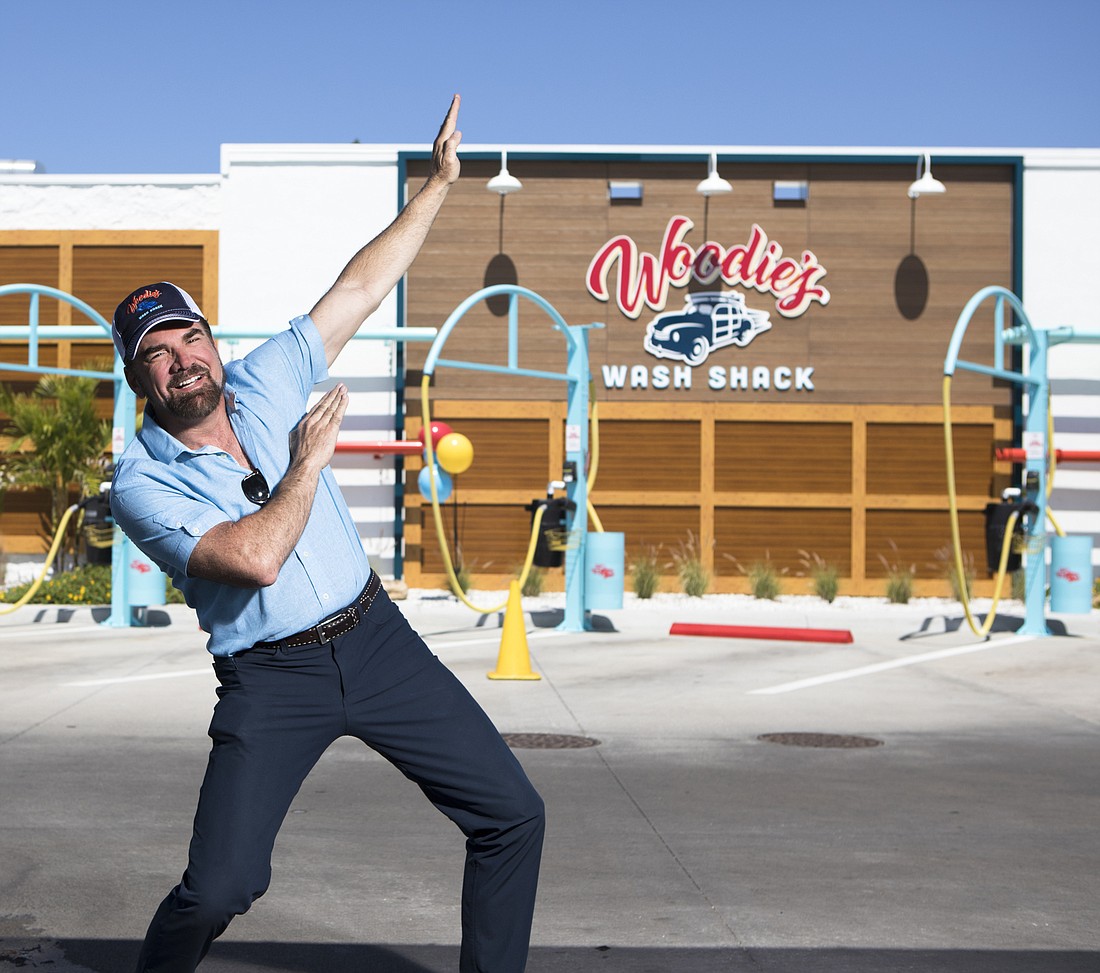- March 29, 2025
-
-
Loading

Loading

Amid a pandemic when people are loath to touch one another and even everyday objects without liberal doses of hand sanitizer, Don Phillips’ decision to open a high-tech chain of automatic car washes that operate using electronic devices similar to a SunPass could be serendipitous.
Phillips — a veteran property developer who specializes in multifamily, office and retail projects — is the managing director of Woodie’s Wash Shack. So far, he’s opened one location, at 5601 66th St. N. in St. Petersburg, an investment of more than $6 million. He's also secured 11 additional sites in Florida and, with five car washes in development via a business partner in Tennessee, aspires to turn the concept into a national brand.
“From the standpoint of the fundamentals, this is the best business I've ever been a part of.” Don Phillips, managing director of Phillips Development & Realty LLC and Woodie’s Wash Shack
The 54-year-old believes the fragmented automated car wash industry is ripe for disruption, calling it a $12 billion industry with no dominant players and a distinct lack of marketing and branding. “Most operators own just one to three car washes,” he says. Many automated car washes are attached to gas stations, which tend not to invest in the type of technological upgrades, such as radio frequency identification tags and a monthly membership model, that Woodie’s Wash Shack has prioritized.
“Things are cheap for a reason,” Phillips says. “I don’t care if it’s tools, cleaning products or wine. If you're buying a car wash for $2, there's a reason you're buying a car wash for $2. [Gas stations] simply cannot invest in the equipment. Our equipment package, on average, costs $1.3 million to $1.5 million. The car wash at a gas station is a $350,000 piece of equipment that can’t do as much.”
However, Phillips, like most others trying to disrupt an industry, says his biggest barrier to growth is historical notions of an industry. In his case, it's “what a car wash is and what it should look like.” As opposed to pumping quarters into a slot, Woodie’s Wash Shack emphasizes sales of monthly memberships that allow customers to wash a car as many times as they desire.
Like someone who owns a gym, Phillips says he’s in the business of selling memberships, not car washes — and that’s a much different approach he thinks will help Woodie’s attract a loyal following and win market share from Mister Car Wash, Zips Car Wash and International Car Wash Group, which are the three largest players in the industry but lack a cohesive, unified brand like Woodie’s. (Michigan-based Tommy's Express Car Wash, also with contact-free payment lanes and memberships, has recently opened several locations on the west coast of Florida, with more in development.)
Before opening at the St. Pete location, which already housed an automated car wash business called Mt. Washmore, Phillips spent $80,000 on branding and merchandise. He dispatched brand ambassadors to the Firestone Grand Prix of St. Petersburg in March last year, before he had even acquired Mt. Washmore, and sold $1,000 worth of Woodie’s Wash Shack gear, which plays up 1950s surfing and classic-car motifs embodied in the music of bands like the Beach Boys.
“It blew my mind that nobody in the car wash business had tapped into one of the greatest eras in the history of America, a true golden age,” says Phillips, who grew up on the coast of North Carolina and was an avid surfer. “When I decided to launch the brand last year, I went to the Grand Prix, [and] there were no other car washes. … I mean, the business of washing cars is about cars! You have the largest automotive event in all of Tampa Bay, and you're not there? It was shocking.”
The Grand Prix experience sealed the deal for Phillips. Having moved $1,000 worth of merchandise for a nonexistent company, he knew he was onto something and, two months later, paid $5.85 million for Mt. Washmore. After spending more than $325,000 on upgrades, he reopened the business as Woodie’s Wash Shack in November.
The business, so far, is serving 700-800 cars per day, and at that rate, Phillips expects 2020 revenues to be in the range of $1.5 million to $1.75 million.
About 50% of the company’s revenue is derived from membership fees, which range from $24 to $36 per month (nonmembers pay $6-$18 per wash). Members receive a radio frequency identification tag that, when affixed to their windshield, allows them to drive right through the point-of-sale kiosk and into the 130-foot car wash tunnel.
One final advantage Phillips sees in the car wash business? The model is remarkably light on labor costs: On most days, the car wash can operate with just two to four staff members on site. “From the standpoint of the fundamentals,” Phillips says, “this is the best business I've ever been a part of.”